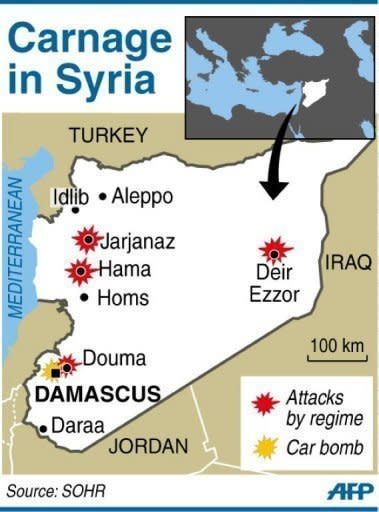France issues stark warning to Syria
French Foreign Minister Alain Juppe on Wednesday labelled the UN-backed peace plan for Syria "seriously compromised" and held out the threat of seeking military action to end the year-long crackdown. UN-Arab envoy Kofi Annan had urged a rapid deployment of the full, 300-strong observer team agreed by the UN Security Council, and Juppe said they should be on the ground in a fortnight, not three months. Without quick progress, Juppe said the international community would have "to move on to another step which we have already started raising with our partners, under Chapter Seven of the United Nations charter." A Chapter Seven resolution, which can be imposed by the Security Council if member states think peace is threatened by an act of aggression, authorises foreign powers to take measures including military options. Juppe pointed out however that such a resolution, which was also mooted by US Secretary of State Hillary Clinton last week, was unlikely to pass, alluding to previous Security Council vetoes from Russia and China. "The Damascus regime does not respect the commitments it made. Repression is continuing. Monitors cannot work on the ground. This cannot last indefinitely," he said after meeting Syrian opposition members in Paris. "Things are not going well," Juppe said. "The Annan plan is seriously compromised but there is still a chance for this mediation, on the condition of the rapid deployment of the 300 monitors." At the moment, there are only 15 observers in the country. Juppe said that May 5, when Annan is to present his next report on the peace process, would be a "a moment of truth." If the UN mission "is not working, we cannot continue to accept the defiance of the regime" and the international community will have "to move on to other things to stop the tragedy." He said he hoped Russia would draw the right conclusions from Syria's efforts to block the monitors' deployment. At least 27 civilians were killed across the country on Wednesday, including in cities visited by monitors, taking to around 300 the number of people who have died since a ceasefire technically went into effect on April 12, the Syrian Observatory for Human Rights said. Twelve of them died in government shelling of the Mashaa al-Tayaran district in the central city of Hama, the London-based Observatory said. Elsewhere, two civilians were killed by sniper fire in Douma, a northeastern suburb of the capital. It was unclear whether UN monitors, who visited Douma on Wednesday, were present before or afterwards. Three soldiers died in clashes with armed rebel groups in the southern province of Daraa, cradle of the uprising against President Bashar al-Assad. Addressing the UN Security Council via teleconference on Tuesday, Annan said he was "concerned" about the violence surging after observers visit individual cities. The former UN chief said Assad has still not fulfilled a promise to end violence and said the situation was "bleak" and "unacceptable." Annan said he was "particularly alarmed" at reports that government forces had entered Hama after a visit by UN monitors and killed "a significant" number of people. "If confirmed this is totally unacceptable and reprehensible," he told the council. Neeraj Singh, spokesman for the advance team of UN monitors, said two were based in Hama and two in Homs -- cities that have both witnessed fierce fighting between government and rebel forces -- and the rest in Damascus. Singh said the observers, who are set to number 30 in the coming days, report back to Annan daily on what they have seen. Annan spokesman Ahmad Fawzi acknowledged that the truce aimed at ending 13 months of violence that the United Nations says has killed more than 9,000 people remained "extremely fragile". He said satellite imagery showed the regime had not fully withdrawn all of its heavy armour from population centres as required by the Annan plan. Fawzi added that in areas visited by the observers, the guns were falling silent but credible reports indicated the violence resumes once they leave. Meanwhile, diplomats said the United Nations will name Major General Robert Mood to head the ceasefire observer mission, and that he is expected to be in Damascus as early as this weekend. UN member states have so far offered only 100 military officers for the unarmed force given the risky mission.






